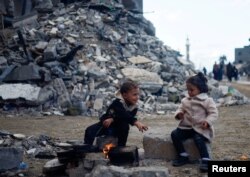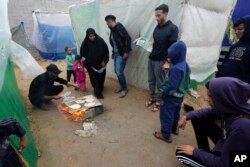Israel and Hamas reached an agreement Monday to extend their cease-fire in Gaza for two more days, with the militants releasing more hostages and the Jewish state freeing more Palestinian prisoners, the Qatari government announced.
The extension of the temporary cease-fire was negotiated by Qatar and came on the final day of the original four-day truce between the warring sides. The United States, which has been calling for a truce as long as hostages are being released, said it welcomed the extended cessation in fighting.
U.S. President Joe Biden said in a statement that the halt in warfare has "enabled a significant surge in additional humanitarian assistance to the innocent civilians who are suffering across the Gaza Strip." He said the U.S. will not stop its diplomatic efforts until all hostages held by Hamas are freed.
"We'd certainly like to see even that extension extended further until all the hostages are released,” said John Kirby, director of strategic communications for the National Security Council. “That's really the goal here, to get all the hostages home with their families where they belong. And you know, however long that could take."
Israel had said it would halt its ground invasion and aerial attack on Hamas in the Gaza Strip by one day beyond the original pact for every 10 additional hostages Hamas releases and free three times that many Palestinians held in Israeli jails on various offenses. Hamas confirmed it had agreed to a two-day extension "under the same terms."
A fourth swap of hostages held by Hamas for Palestinian prisoners was underway late Monday, with the Israel Defense Forces saying that 11 hostages held by Hamas had been released and were on their way to Israel. In all, 50 Israeli hostages were freed over the last four days, and 150 Palestinians were expected to be released.
While the extended cease-fire held out the prospect of a longer truce, Israel has remained adamant in its stated goal of crushing Hamas' military capabilities and ending its 16-year rule over Gaza, the narrow territory along the Mediterranean Sea, after the shock October 7 Hamas attack on southern Israel that killed about 1,200 people and led to the Hamas capture of about 240 hostages, according to Israel.
Israel's offensive against Hamas militants in Gaza has killed more than 14,000 people, the majority of them women and children, according to Gaza health officials.
Under the original agreement, before any Monday swap of hostages and prisoners, 58 hostages have been released, including 39 Israelis. Before the truce, four hostages were freed, another rescued and two were found dead inside Gaza. More than 100 Palestinians have been freed from Israeli jails.
In a statement, two relatives of Abigail Edan, a 4-year-old girl with dual Israeli American citizenship who was released Sunday, said, "We can get all hostages back home. We have to keep pushing."
Abigail was the lone American in the weekend hostage exchange, a fact that Biden highlighted, saying, “She's free, and Jill [Biden] and I, together with so many Americans, are praying for the fact that she is going to be all right."
Hamas, a U.S.-designated terror group, and other allied militants could still be holding up to 175 hostages, enough to potentially extend the cease-fire for two and a half weeks.
But the hostage group includes a number of Israeli soldiers, and the militants could make stiffer demands for their release.
U.S. Secretary of State Antony Blinken, who attended a NATO meeting in Brussels on Monday, will head to Israel and the West Bank late Wednesday, according to a senior State Department official.
Blinken has visited Israel multiple times on his previous two trips to the region since the Israel-Hamas war began.
In his meetings in the Middle East, Blinken "will stress the need to sustain the increased flow of humanitarian assistance to Gaza, secure the release of all hostages, and improve protections for civilians in Gaza," a senior State Department official said on background.
The White House said in a statement Sunday that Biden and Israeli Prime Minister Benjamin Netanyahu spoke about the release of hostages and discussed the pause in the fighting and the surge in much-needed additional humanitarian assistance into the Gaza Strip.
In Barcelona, European Union foreign policy chief Josep Borrell called the four-day truce an "important first step," but said much more is needed to "alleviate the dire situation in Gaza and to find a way out of the current crisis."
"The pause should be extended to make it sustainable and long-lasting while working for a political solution," he said Monday at the start of a meeting of the Union for the Mediterranean.
Borrell said the "indiscriminate brutality" of the Hamas attack on Israeli civilians cannot be justified but said "one horror cannot justify another horror," noting the widespread destruction in Gaza from Israel's military campaign.
But analysts say this widely welcomed pause is unlikely to bring an end to this complex — and for both sides, existential — conflict.
“There are two separate problems,” said Michael O’Hanlon, a senior fellow and director of research in foreign policy at the Brookings Institution. “The long-term end to the fighting is going to require the dismantlement of Hamas — probably not in any realistic way the complete elimination of all of its fighters or capabilities or ideas — but the top leadership has to go. Hamas’ ability to rule Gaza has to go. And I don't see that as having been changed in any way, shape or form by the current pause in the fighting.”
China said Monday its top diplomat, Wang Yi, will preside over a Wednesday U.N. Security Council meeting focused on the Israel-Hamas situation.
Chinese Foreign Ministry spokesperson Wang Wenbin told reporters that China hopes the talks would lead to a prolonged cease-fire and an end to the fighting, and alleviate the humanitarian crisis in Gaza.
The pause in fighting has allowed an increase in the badly needed humanitarian aid reaching Gaza, where the U.N. says an estimated 1.7 million people — about three-quarters of the population — are displaced.
The U.N. Office for the Coordination of Humanitarian Affairs said late Sunday that cooking gas reached Gaza, but the amount was still well below what people need.
The agency also continued to describe "overcrowding and poor sanitary conditions" at U.N.-run shelters, where half of those forced from their homes by the conflict are staying.
VOA State Department bureau chief Nike Ching contributed to this article. Some information for this story came from The Associated Press, Agence France-Presse and Reuters.










